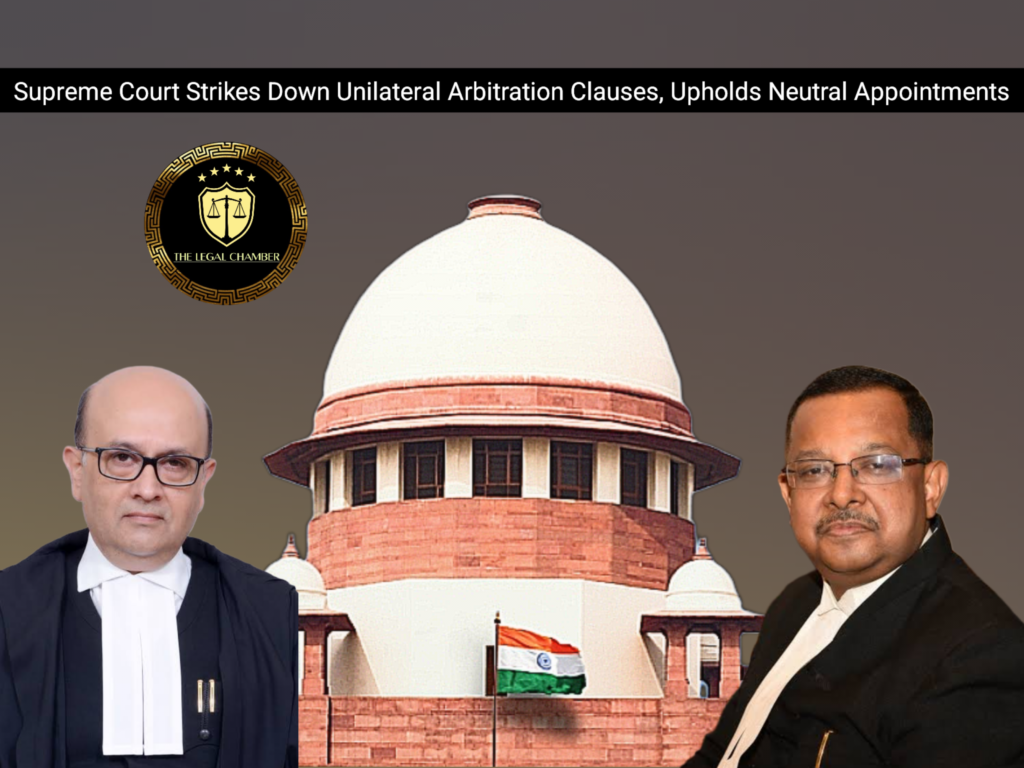
This Supreme Court judgment affirms that a unilateral arbitration clause granting one party the sole power to appoint an arbitrator is invalid. Following the Constitution Bench in CORE, the Court held that an ineligible person (such as a Managing Director) cannot nominate a sole arbitrator, as it raises justifiable doubts regarding impartiality under Section 12(5) of the Arbitration and Conciliation Act, 1996.
Facts Of The Case:
The appellant, Bhayana Builders Pvt. Ltd., filed petitions before the Delhi High Court under Section 14(2) of the Arbitration and Conciliation Act, 1996, seeking to terminate the mandate of a sole arbitrator. This arbitrator had been unilaterally appointed by the Managing Director of the respondent, Oriental Structural Engineers Pvt. Ltd., pursuant to Clause 9.03 of their subcontract agreement. This clause explicitly granted the Managing Director the exclusive power to nominate the sole arbitrator, including any replacements. Relying on the Supreme Court’s precedent in TRF Ltd. v. Energo Engg. Projects Ltd., the appellant argued that such a unilateral appointment mechanism rendered the arbitrator de jure ineligible and raised justifiable doubts about his impartiality. The High Court rejected these petitions, leading the appellant to appeal to the Supreme Court. The core factual dispute centered on the validity of the appointment process itself, rather than the underlying merits of the commercial dispute between the parties.
Procedural History:
The procedural history began with the appellant filing petitions under Section 14(2) of the Arbitration and Conciliation Act, 1996 before the Delhi High Court. These petitions sought to terminate the mandate of the sole arbitrator who was unilaterally appointed by the respondent’s Managing Director. The High Court, vide its order dated February 21, 2018, rejected these petitions. The appellant then appealed to the Supreme Court by way of Special Leave Petitions (SLP (C) Nos. 7161-7162 of 2018). The Supreme Court granted leave and, upon hearing the appeal, reversed the High Court’s decision, terminating the arbitrator’s mandate and referring the matter to the Delhi International Arbitration Centre for a fresh appointment.
READ ALSO:Divorce Final, But Alimony Increased: Supreme Court Orders Doctor to Pay Engineer-Turned-Lawyer ₹50 Lakhs
Court Observation:
The Court observed that an arbitration clause granting one party the unilateral power to appoint a sole arbitrator is impermissible. It affirmed the Constitution Bench ruling in CORE which upheld the principles in TRF Ltd. and Perkins Eastman, declaring that such a clause creates justifiable doubts regarding the arbitrator’s impartiality and independence. The Court held that a person, such as a Managing Director, who is themselves ineligible to act as an arbitrator under Section 12(5) read with the Fifth Schedule of the Act, is also legally incompetent to unilaterally nominate a sole arbitrator. This ineligibility is by operation of law and renders the entire appointment process invalid.
Final Decision & Judgement:
The Supreme Court allowed the appeals and terminated the mandate of the sole arbitrator who was unilaterally nominated by the Managing Director of the respondents. The Court held that the unilateral appointment mechanism was invalid as an ineligible person cannot nominate an arbitrator. Consequently, the matter was referred to the Delhi International Arbitration Centre for the appointment of a suitable and impartial arbitrator to adjudicate the disputes between the parties.